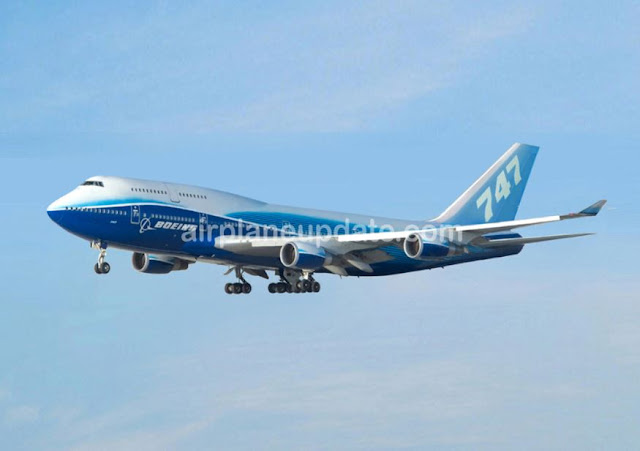Boeing 747-8 Intercontinental Specs, Interior, Seats, Engines, and Price – Since
its historic debut at the Paris Air Show in 1969, the Boeing company has
introduced a number of variations on the 747 family, including the 747-100,
747-200 and 747-300. The most common variation for international travelers
today is version 747-400. Every new version has brought additional devices. The
most striking 747-400 change is the addition of winglets, which Boeing
described as "wingtip extensions that reduce lift-induced barriers and
provide several lift lifts. But 747-400 production ended in 2009.


Boeing 747-8 Intercontinental
As
a replacement for the 747-400, Boeing launched the 747-8 Intercontinental
version. Each dimension of 747-8 consists of about 6 million parts. In its
monumental size, the 747 has its own icon, which is a very large wing, four
engines and the front end "hump" makes it one of the best known
aircraft in the world. To this day, the "upstairs" seating area is
provided for some lucky flights by giving passengers a sense of prestige and
exclusivity. The Boeing 747 jumbo jet revolutionizes air travel, adds luxury,
romance and, most significantly, is the affordability of commercial flights.
Although the 747 has a very large size, the term "Jumbo Jet" is
claimed by Airbus with the A380 aircraft.

Boeing 747-8 Seats
The
First Class and Business Class sections at 747-8 allow airlines to offer
passengers the most private and premium accommodations in space. So it's not
surprising that on high-volume routes the 747-8 offers premium revenue
potential. And with more than 400 seats available, the new 747 creates a unique
opportunity to maximize the bottom line potential of all high-volume routes.
The
747-8 passenger version first debuted in 2011 and was ordered by only a few
airlines, including Korea, Lufthansa and Air China. This aircraft can
accommodate up to 467 passengers and can fly as far as 8,000 nautical miles.
According to the official Boeing order book, there are still 747-8 passenger
aircraft left to send. One of them was the last order for Korean Airlines and
the other for an unknown 747-8 aircraft recently removed from the ledger which
was originally headed for the Russian airline Transaero. The airline went
bankrupt in October 2015. Two of the three planes it ordered were built by
Boeing but were never sent. The planes are now in storage and it is not clear
where they will end.


Boeing 747-8 Specs
If you pay attention the 747-8 Intercontinental shape looks the same as 747. But 70% of the aircraft's structural weight is new, it has the same iconic shape, although with some visible external differences. The wing is a key 747-8 aircraft, a sophisticated technology airfoil applied to super critical wings and wingtips designed using computational fluid dynamics. Version 747-8 is about 14% more fuel efficient per seat than its predecessor and is combined with 4 newly developed General Electric engines.
Dimensions
|
|
Length (m)
|
76.3
|
Wingspan (m)
|
68.4
|
Height (m)
|
19.4
|
Weight
|
|
Maximum take-off weight (kg)
|
442 300
|
Maximum landing weight (kg)
|
312 100
|
Operating empty weight (kg)
|
211 900
|
Maximum zero fuel weight (kg)
|
288 000
|
Maximum payload (kg)
|
76 300
|
Standard fuel capacity (litres)
|
243 400
|
Performance
|
|
Range with max payload (km)
|
14 816
|
Cruise speed (km/h)
|
920
|
Maximum operating altitude (m)
|
13 100
|
Engines
|
GE GEnx-2B67,
4 x 66500 lb |
Cabin
Data
|
|
Passengers (3-class)
|
410
|
Cabin width (m)
|
6.13
|
Boeing 747-8 Price
The
price of Boeing 747-8 is US$ 402.9 M in 2018. The Price reflecting a range of
available options and configurations for each model. Configurations and options
that may affect price include performance capability, interiors, avionics, fuel
capacity, and others.








No comments:
Post a Comment